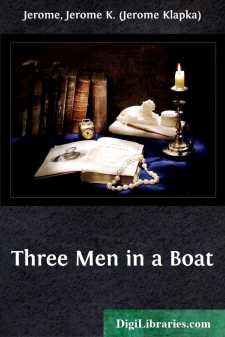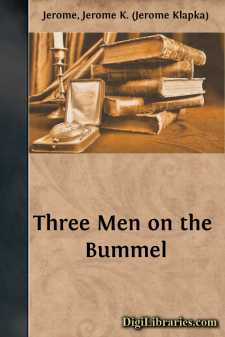Categories
- Antiques & Collectibles 13
- Architecture 36
- Art 48
- Bibles 22
- Biography & Autobiography 816
- Body, Mind & Spirit 145
- Business & Economics 28
- Children's Books 17
- Children's Fiction 14
- Computers 4
- Cooking 94
- Crafts & Hobbies 4
- Drama 346
- Education 58
- Family & Relationships 59
- Fiction 11834
- Foreign Language Study 3
- Games 19
- Gardening 17
- Health & Fitness 34
- History 1378
- House & Home 1
- Humor 147
- Juvenile Fiction 1873
- Juvenile Nonfiction 202
- Language Arts & Disciplines 89
- Law 16
- Literary Collections 686
- Literary Criticism 179
- Mathematics 13
- Medical 41
- Music 40
- Nature 179
- Non-Classifiable 1768
- Performing Arts 7
- Periodicals 1453
- Philosophy 66
- Photography 2
- Poetry 897
- Political Science 203
- Psychology 45
- Reference 154
- Religion 516
- Science 126
- Self-Help 85
- Social Science 82
- Sports & Recreation 34
- Study Aids 3
- Technology & Engineering 59
- Transportation 23
- Travel 463
- True Crime 29
Jerome K. (Jerome Klapka) Jerome
Jerome Klapka Jerome was an English writer and humorist best known for his comic travelogue "Three Men in a Boat," published in 1889. His works often feature light-hearted and witty observations on everyday life and human nature, which made him popular during the late Victorian and Edwardian eras. Jerome also wrote plays, essays, and other novels, contributing significantly to English humor literature.
Author's Books:
Sort by:
CHAPTER I. Three invalids.—Sufferings of George and Harris.—A victim to one hundred and seven fatal maladies.—Useful prescriptions.—Cure for liver complaint in children.—We agree that we are overworked, and need rest.—A week on the rolling deep?—George suggests the River.—Montmorency lodges an objection.—Original motion carried by majority of three to one. There were four of...
more...
CHAPTER I She had not meant to stay for the service. The door had stood invitingly open, and a glimpse of the interior had suggested to her the idea that it would make good copy. “Old London Churches: Their Social and Historical Associations.” It would be easy to collect anecdotes of the famous people who had attended them. She might fix up a series for one of the religious papers. It...
more...
DOES THE YOUNG MAN KNOW EVERYTHING WORTH KNOWING? I am told that American professors are "mourning the lack of ideals" at Columbia University—possibly also at other universities scattered through the United States. If it be any consolation to these mourning American professors, I can assure them that they do not mourn alone. I live not far from Oxford, and enjoy the advantage of occasionally...
more...
CHAPTER I. If you take the Underground Railway to Whitechapel Road (the East station), and from there take one of the yellow tramcars that start from that point, and go down the Commercial Road, past the George, in front of which starts—or used to stand—a high flagstaff, at the base of which sits—or used to sit—an elderly female purveyor of pigs’ trotters at three-ha’pence apiece, until you...
more...
MALVINA OF BRITTANY. THE PREFACE. The Doctor never did believe this story, but claims for it that, to a great extent, it has altered his whole outlook on life. "Of course, what actually happened—what took place under my own nose," continued the Doctor, "I do not dispute. And then there is the case of Mrs. Marigold. That was unfortunate, I admit, and still is, especially for Marigold. But,...
more...
“Come in!” said Peter Hope. Peter Hope was tall and thin, clean-shaven but for a pair of side whiskers close-cropped and terminating just below the ear, with hair of the kind referred to by sympathetic barbers as “getting a little thin on the top, sir,” but arranged with economy, that everywhere is poverty’s true helpmate. About Mr. Peter Hope’s linen, which was white though somewhat...
more...
REGINALD BLAKE, FINANCIER AND CAD The advantage of literature over life is that its characters are clearly defined, and act consistently. Nature, always inartistic, takes pleasure in creating the impossible. Reginald Blake was as typical a specimen of the well-bred cad as one could hope to find between Piccadilly Circus and Hyde Park Corner. Vicious without passion, and possessing brain without...
more...
CHAPTER I Three men need change—Anecdote showing evil result of deception—Moral cowardice of George—Harris has ideas—Yarn of the Ancient Mariner and the Inexperienced Yachtsman—A hearty crew—Danger of sailing when the wind is off the land—Impossibility of sailing when the wind is off the sea—The argumentativeness of Ethelbertha—The dampness of the river—Harris suggests a bicycle...
more...
PREFACE Said a friend of mine to me some months ago: “Well now, why don’t you write a sensible book? I should like to see you make people think.” “Do you believe it can be done, then?” I asked. “Well, try,” he replied. Accordingly, I have tried. This is a sensible book. I want you to understand that. This is a book to improve your mind. In this book I tell you all about...
more...
PROLOGUE Years ago, when I was very small, we lived in a great house in a long, straight, brown-coloured street, in the east end of London. It was a noisy, crowded street in the daytime; but a silent, lonesome street at night, when the gas-lights, few and far between, partook of the character of lighthouses rather than of illuminants, and the tramp, tramp of the policeman on his long beat seemed to...
more...











